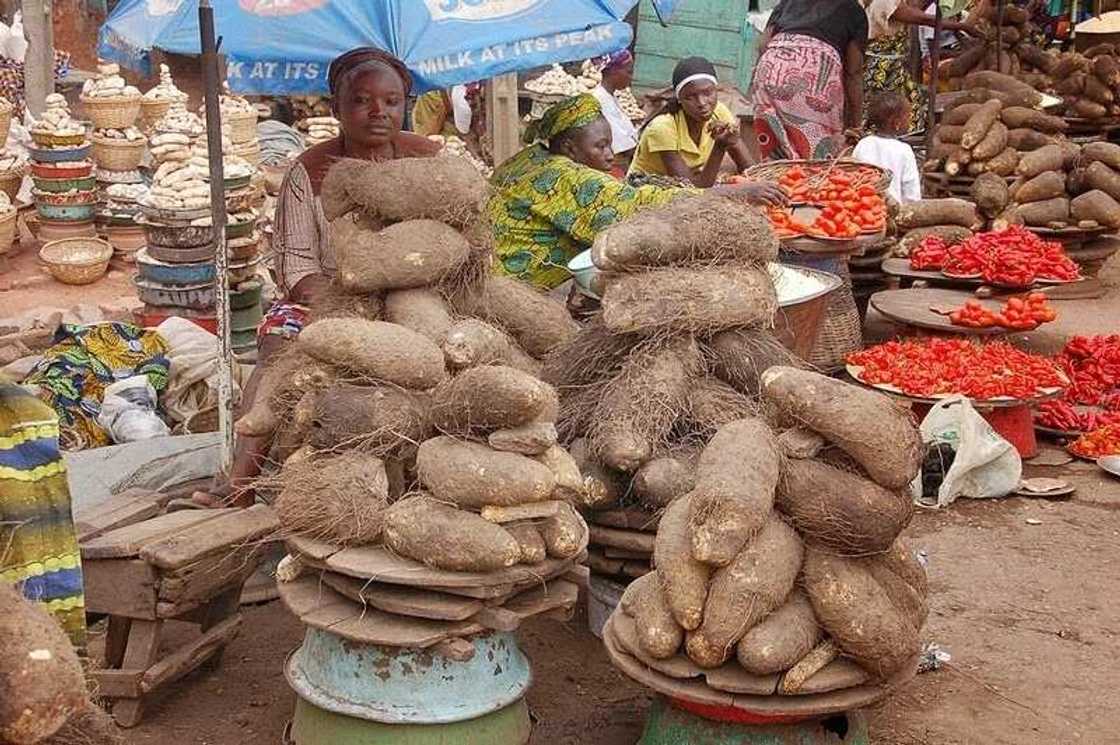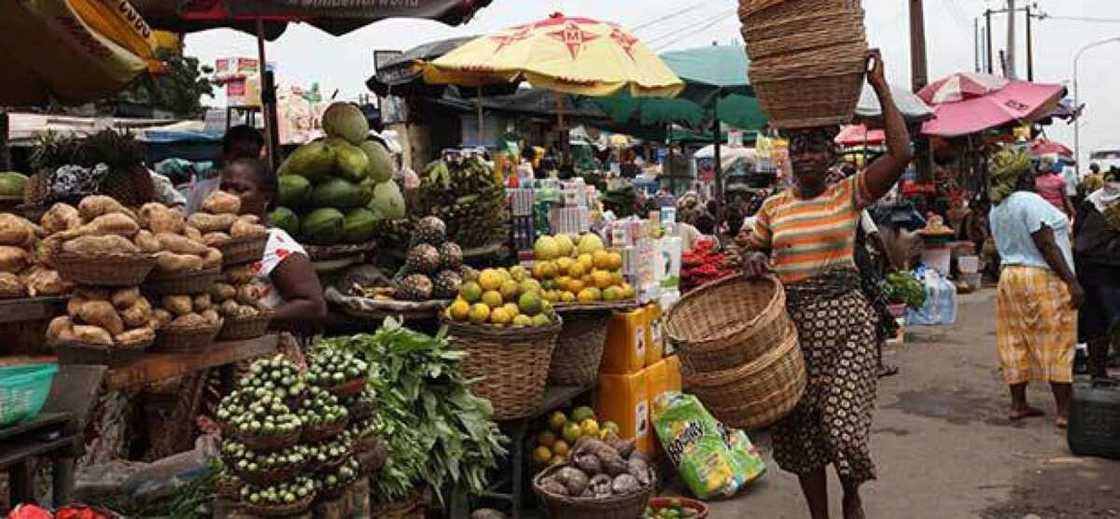Nigerians Lament Hike in Food Prices Despite Inflation Rate Easing to 21.34 Per Cent
- The inflation rate for December 2022 dropped to 21.34% from 21.47% recorded in November, according to new data from the National Bureau of Statistics (NBS)
- Yet, the prices of food items continue to push northward in major markets in Lagos, as a result of the biting inflation
- Nigeria has been struggling with a double-digit inflation rate since February 2016, which rose to 21.47% in November 2022, the highest in 17 years
PAY ATTENTION: How media literate are you? Click to take a quiz – bust fake news with Legit.ng!
To the surprise of many Nigerians, the country's inflation rate for the month of December 2022 eased to 21.34% from November's 21.47%. This is in spite of the Christmas and New Year festivities.

Source: Depositphotos
According to a report released by the National Bureau of Statistics (NBS) which was released on Monday, January 16, 2023, the inflation rate in December 2022, even though it amounts to a drop of just 0.12% points from November of the same year, it reflects a 5.72% points increase when compared to 15.63% recorded in December 2021.
While the inflation in food prices rose to 23.75% in December 2022, a 6.38% increase from the 17.37% rate recorded in December 2021 and 0.49% higher compared to the rate recorded in November 2022. Despite the drop in the inflation rate, month-on-month, reports of hikes in food prices in the markets seem to tell a different story.
The NBS, in its report, also stated that the food prices inflation was noticeable in the rise in certain food items including fish, yam tubers, bread, potatoes, cereals, and others.
PAY ATTENTION: Follow us on Instagram - get the most important news directly in your favourite app!
Causes of food inflation
The NBS has often stated that the factors responsible for the continued inflation in Nigeria include, but are not limited to, rising cost of importation, insecurity in some parts of the country, increase in transportation cost, increase in energy cos, the depreciation of the naira and this year's flooding in some states.
But for December, the inflation rate is mostly attributed to a sharp increase in demand usually experienced during festivities.
As a result, food inflation was highest in Sokoto at 3.38%, Oyo at 3.10% and Kaduna at 2.97%. Nasarawa, Osun and Kogi recorded the slowest rise in inflation at 0.06%, 0.70% and 0.76% respectively when compared on a month-on-month basis.
The report doesn't reflect market reality
The prices of major staple food items continue to push northward in major markets in Lagos, as a result of the biting inflation.

A sample of the prices of food items in various markets in Lagos, particularly in Oyingbo, Oshodi and Mile 12, shows that the price of almost every item shot up since the festive season. For example, a big bag of pepper which initially sold for N32,000 is now selling for N39,000 at Oyingbo market. A paint bucket of tomatoes which sold for N2,200 in November 2022, now sells for N2,800 in January 2023.
Traders in the markets express worry over the volatility of the prices of food items. Madam Adetoun who sells tomatoes and pepper at Mile 12 market told Legit.ng that sometimes the prices are based on the quantity of supply that arrives at the market. She said:
Sometimes, the availability of tomatoes and pepper coming from the Northern part of the country affects the upward and downward movement of the prices. Because they are perishable items, if there is a surplus in the market, the price will reduce and if they are scarce, the price will increase.
In Oyingbo market, a carton of chicken now sells for N28,000 from N20,000 it sold in November 2022. The price of a 50kg bag of rice, depending on the brand sells for an average of N40,000, even though the average price in November was N38,000.
Other items like yam, onions, maize, groundnut oil and a carton of turkey also experienced significant hikes in December, as a result of the festivities. Mallam Abu, a trader at Oyingbo stated that the hike in prices during the December/January period is often connected to festivities and high demand. He said:
Whenever there is a festive period like Easter, Sallah or Christmas, prices usually increase. This is because demand increases and people seem to do a lot more cooking in these periods than they usually do.
Jimi Ojo, a social commentator and lead analyst at Statman Consulting, who weighed in on the matter told Legit.ng that the inflation in food prices will continue until the insecurity in the northern part of the country is contained. He stated:
Farmers in the Adamawa, Benue, Taraba and other states are scared of going to the farms because of the threats by killer herdsmen and bandits. When crops are not planted or harvested, then it is a must that we will have problems with food supply across the country.
On her part, Chinyere Kalu, an economist at Granite Ideas says she is sometimes doubtful of the NBS' figures when compared with current economic realities. She said:
I'm not sure how inflation could have eased in December when we all know how prices skyrocket during this period. I went to the market to do some shopping for my family and the price of almost every item were on the high side.
Taiwo Oyedele, a Fiscal Policy Partner and Africa Tax Leader at PricewaterhouseCoopers (PwC) attempts an explanation of the current drop in inflation. He said:
The news of inflation declining from 21.47% in Nov to 21.34% in Dec'22 doesn't mean things are cheaper. It means prices are still going up but at a slower pace. So, don't be confused that goods & services are actually more expensive now, that's exactly what the data is saying.
Nigeria has been struggling with a double-digit inflation rate since February 2016 which rose to the highest in 17 years at 21.47% in November 2022. The December'2022 rate of 21.34% marked the first time the inflation rate dropped on a month-on-month basis in 7 months.
Nigeria Workers Count Salary Losses As 2022 Ends With 21.34% Inflation
In related news, Legit.ng reported that according to the NBS' Consumer Price Index report released on Monday, January 16, 2023, Nigeria’s inflation rate reclined to 21.34% in December 2022 from 21.47% recorded in November of the same year.
According to the World Bank, the rise in Nigeria's inflation continues to erode the meagre N30,000 minimum wage earned by workers, thereby widening the poverty index of millions of citizens. This negatively impacts the purchasing power of citizens, especially those earning fixed incomes.
Economists calculate workers’ real income by dividing their wages by the annual inflation rate. It is calculated as [Wages / (1 + 21.34%) = Real Income].
Nigeria's minimum wage is N30,000 monthly or N360,000 yearly.
Using the above formula, an average Nigerian worker’s annual salary of N360,000, when adjusted for inflation, is actually N24,723 monthly or N296,676 yearly.
Source: Legit.ng


